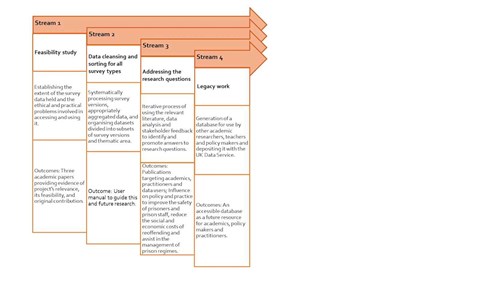Secondary analysis of data collected over a 20 year period by HM Inspectorate of Prisons. A project in partnership with HMI Prisons, funded by the ESRC.
Project Overview
For more than two decades, HM Inspectorate of Prisons for England and Wales (HMI Prisons) has conducted detailed, confidential surveys of prisoners and other detainees as an integral part of its inspections. This has generated a unique database of historic survey data from at least 100,000 respondents, with more than 10 million analysable responses.
Surveys cover a wide range of topics – from views on the quality and quantity of food to concerns about safety – and provide an invaluable insight into the experiences and perceptions of treatment and conditions for prisoners and detainees since 2000.
HMI Prisons has always published findings, with its reports, drawn from its analysis of survey material, but has not made the full raw data more widely available for further research purposes. Now, however, with the support of HMI Prisons, a research team from the Department of Law and Criminology at Royal Holloway University of London (RHUL), has obtained a £240,000 grant from the ESRC's Secondary Data Analysis Initiative to study this raw data for the first time.
The project begins in December 2021 and will focus initially on data from adult prisons, though data from other places of detention will also be prepared for potential wider use. The overall project will inform and enrich the Inspectorate's thematic and other inspection work, and the information it provides to other bodies. It will also be of wide benefit to practitioners, policy makers and academic researchers.
Aims & Duration
The project will answer key questions related to prisoners' experiences of imprisonment and develop a 20 year database of over 100,000 prisoner surveys to:
- Identify prisoners' self-reported characteristics (including age, ethnicity, gender) and experiences of imprisonment with regard to key elements of their treatment and conditions;
- Understand how these self-reported experiences differ according to prisoners' characteristics and circumstances, sentence type, prison held in and operational / policy changes;
- Use this knowledge to inform the work of practitioners and policy makers;
- Produce data-maps for all types of detention that have been surveyed (male and female prisons, juvenile custody, military and immigration detention);
- Prepare aspects of the database for use by other academic researchers, teachers and policy makers, with accompanying guides.
Research Team
Our multi-disciplinary RUHL research team:
- Prof. Rosie Meek (Department of Law and Criminology)
- Prof. Nick Hardwick (Department of Law and Criminology)
- Prof. Kathy Rastle (Department of Psychology)
- Prof. Arnaud Chevalier (Department of Economics)
- Dr. Melissa Henderson (Department of Law and Criminology)
- Dr. Kim Reising (Department of Law and Criminology)
- Dr. Janet Bowstead (Department of Law and Criminology)
The project is supported by an advisory group with representatives from academia, policy and practice:
- Anne Fox, CEO of Clinks
- Prof. Betsy Stanko, OBE
- Khatuna Tsintsadze, Co-director of the Zahid Mubarek Trust
- Prof. David Denney
- Michael Spurr, CB
Publications & Dissemination Activities
2023
On 25 May, the ESRC funded project "Secondary analysis of data collected over a 20 year period by HM Inspectorate of Prisons" culminated in a successful data launch event at the Senate House in London, marking a momentous celebration of the publication of the HMIP data. The slides of the presentations are available here, and the handout can be found here.
From 27 to 30 March, we attended the 11th annual meeting of the European Society of Criminology's Prison Working Group in Israel and talked about "Opportunities to access prisoner survey data over a 20 year period: Exploring inspectorate data from every prison in England and Wales". The slides of our presentation can be found here.
On 3 March, we presented our project at the Criminal Justice Alliance (CJA) research symposium on "Improving Trust in the Criminal Justice System and Research". The handout of our workshop is available here.
2022
On 29 June, the project team attended the British Society of Criminology Conference: Reimagining Criminological Futures - New Criminologies in a Changing World. We participated in a roundtable discussion on "Food in Prison" which explored the notion that food in prison is political. The book of abstracts is available here.
On 23 February, the Crime and Punishment Research Cluster launched the ESRC funded project "Secondary analysis of data collected over a 20 year period by HM Inspectorate of Prisons". The slides of the presentations given at the event are available here. The recording of the event is available below:
2021
Quinn, A. Hardwick, N. and Meek, R. (2021) With age comes respect? And for whom exactly? A quantitative examination of prisoner experiences of respect elicited through HM Inspectorate of Prisons survey responses. The Howard Journal of Crime and Justice 60:2, pages 251-272, DOI: 10.1111/hojo.12413
2020
Quinn, A., Denney, D., Hardwick, N., Jalil, R. and Meek, R. (2020) The feasibility and challenge of using administrative data: a case study of historical prisoner surveys. International Journal of Social Research Methodology, DOI: 10.1080/13645579.2020.1853877
Quinn, A., Shaw, C., Hardwick, N., Meek, R., Moore, C., Ranns, H. and Sahni, S. (2020) Prisoner interpretations and expectations for the ethical governance of HMIP survey data. Criminal Justice Ethics 39:3, 163-182, DOI: 10.1080/0731129X.2020.1859298
Research Questions
- What are the relationships between self-reported characteristics and experiences of prisoners who report feeling unsafe and what does this suggest about who is at risk and where interventions should be made to improve prisoner safety?
- What are the relationships between self-reported characteristics and experiences of prisoners and how do these vary according to perceptions of likelihood of reoffending and the rehabilitative support received? What does this suggest about where and to whom interventions should be targeted in order to best to support rehabilitation?
- How do the conditions and experiences prisoners report relate to the amount of time they are unlocked from their cell each day and their opportunities to engage in purposeful activity, including education, recreation, and offending behaviour programmes? How could this knowledge be used to improve prison regimes?
- How do survey responses and observed trends change over time and in relation to significant policy and organisational differences/changes, and according to prisoners' characteristics, sentence and prison?
Partners and Funder
The project is based at the School of Law and Social Sciences, Royal Holloway, University of London, conducted in partnership with HMI Prisons and funded by the ESRC.
























